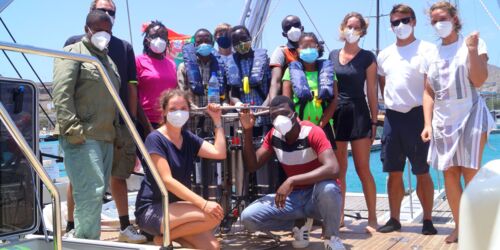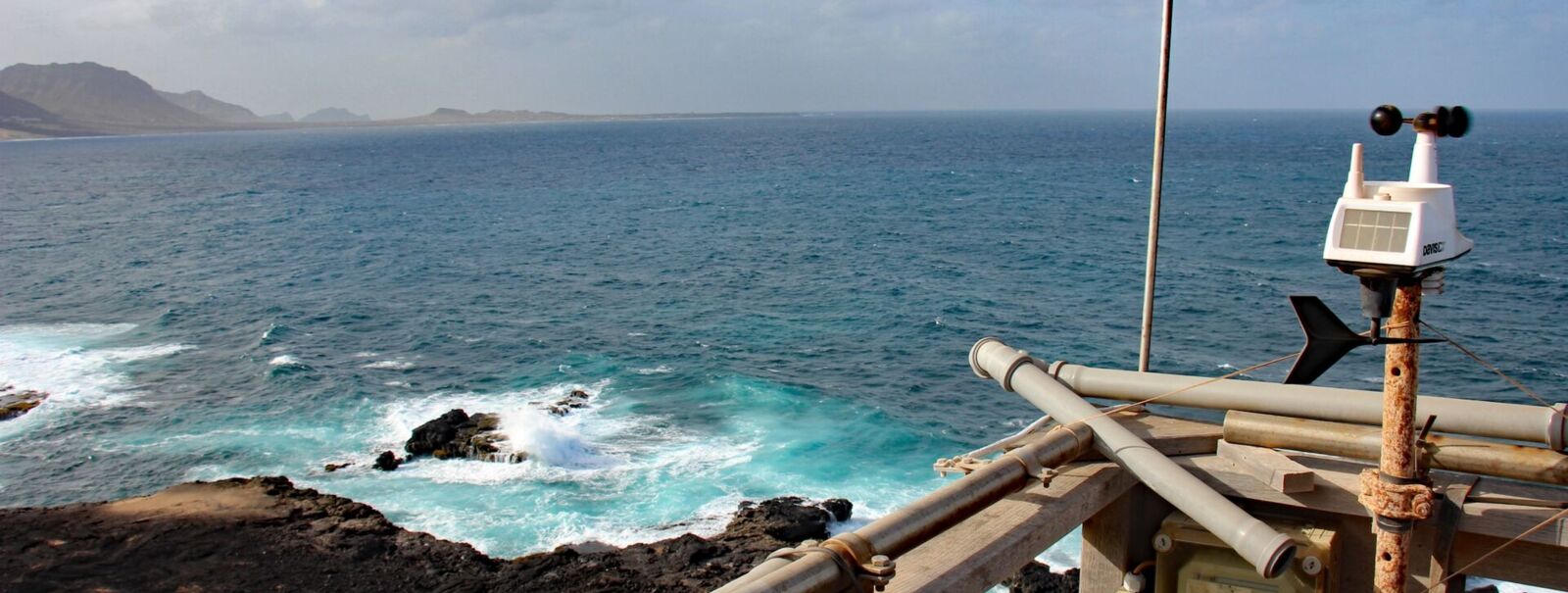S/Y Eugen Seibold research vessel visits the OSCM
by OSCM

April/May 2021 / Mindelo / Kiel / Mainz
S/Y Eugen Seibold ocean research sailing yacht visits the Ocean Science Centre Mindelo on her way to the equator
The ultra-modern 22 m long ocean research sailing yacht Eugen Seibold from the Max-Planck-Institute for Chemistry (MPIC), Mainz, Germany paid a visit to the Ocean Science Centre Mindelo (OSCM) on her way to the equator. In a joint campaign, the team of the S/Y Eugen Seibold together with an OSCM team member sailed out to sample the Cape Verde Ocean Observatory (CVOO). At this ocean monitoring site, which is located approx. 110 km northeast of the Cabo Verdean island São Vicente, the team sampled various climate-relevant environmental parameters. Additionally, the S/Y Eugen Seibold took West-African students from the Atlantic Technical University (UTA) Cabo Verde onboard and hosted a day cruise at sea.
Since 2018, the ocean research sailing yacht S/Y Eugen Seibold has been operating and exploring the ocean under the scientific direction of the Max Planck Institute (MPI) for Chemistry in Mainz, Germany co-financed by the Werner Siemens Foundation, Switzerland. Gerald Haug, director of the climate geochemistry department at the MPIC, is the initiator of this unique research vessel envisioned to be used flexibly all year round and with zero emissions to ensure contamination-free sampling. The idea took root and the research sailing yacht was primarily intended to collect planktic Foraminifera to develop and calibrate biogeochemical proxies for its application in paleoceanography to improve the understanding of past and future climate scenarios. After three years in the service of science, the research programme of the S/Y Eugen Seibold project has increased considerably. In addition to the original idea, the range of applications onboard has expanded deep into advanced oceanography and geochemistry. With state-of-the-art laboratory equipment and even onboard mass spectrometers, the S/Y Eugen Seibold is perfectly equipped to conduct high-level analytics out at sea.
The overall goal of the S/Y Eugen Seibold project is to sail a defined 10,000-mile track from Iceland to the equator once a year over a ten-year period and to record a series of system-relevant measurements along this route. The scientific focus of this project lies on analysing the upper water column and lower atmosphere. The data recorded consists of physical (e.g. temperature), chemical (e.g. oxygen) and biological (e.g. chlorophyll) parameters, among many others. In addition to these measurements, the scientists on board the S/Y Eugen Seibold collect aerosols to identify via molecular genetic methods associated bacteria and viruses. On top of this already ambitious programme, they also perform carbon dioxide measurements in the surface water and lower atmosphere in a very high spatial and temporal resolution alternately taken between surface water and atmosphere every 30 minutes. All measurements performed on this 10,000-mile track serve to create a comprehensive decadal data set, which will provide system-relevant data and a deepened understanding of the ocean-atmosphere system and climate change. In 2021, in spite of massive complications caused by the COVID-19 pandemic, the S/Y Eugen Seibold team successfully completed the first sailing track from Iceland to the Equator, see figure 1.
On her long way southwards to the Equator, the S/Y Eugen Seibold team stopped over at the Cabo Verdean island São Vicente and visited for a joint campaign with the OSCM. In a joint cruise to the CVOO station, located about 110 km northeast of São Vicente (17.6°N 24.3°W), the scientists sampled the upper water column using a CTD (conductivity, temperature, depth) rosette and a multinet to collect water samples and plankton, see images below.
After the team had successfully completed the sampling at the ocean monitoring sites, the S/Y Eugen Seibold returned to Mindelo and took a student cohort onboard to host a day excursion at sea as part of another joint campaign with the OSCM. The participating students were students from the UTA enrolled in the master programme Climate Change & Marine Sciences (MRP-CCMS) under the West African Science Service Centre on Climate Change and Adapted Land Use (WASCAL) programme. The master programme is funded by the German Ministry for Education and Research (BMBF) and comprises students from 11 West-African countries. On board, three scientists taught the students during a full day onboard in how to use the CTD rosette and the multinet, see photos below. The day cruise was a very special highlight for the WASCAL students, since a previously planned expedition on the research vessel Meteor, in which the students should have participated, had to be cancelled due to the pandemic. Through the cruise with the S/Y Eugen Seibold, the students had the great opportunity to catch up and to gain practical experience at sea as well as authentic insights into research life on board.
For the S/Y Eugen Seibold team, the joint CVOO campaign and the day cruise with the WASCAL students was also a great success and in the spirit of the project, as the S/Y Eugen Seibold project has a focus on promoting education and linking scientific interests.
 |
|||
Caption from left to right and top to bottom
S/Y Eugen Seibold in the harbour of Mindelo, Sao Vicente, Cape Verde. Picture credit: Ralf Schiebel, Max-Planck-Institute for Chemistry, Mainz, Germany.
OSCM team member Péricles Silva onboard of the S/Y Eugen Seibold taking water samples at the CVOO with the ship's own CTD rosette and analysing the water samples in the ship’s laboratory. Picture credit: Max-Planck-Institute for Chemistry, Mainz, Germany.
WASCAL students onboard of the S/Y Eugen Seibold during the day cruise. Scientist explaining the students how to handle the CTD rosette to collect water samples and the multinet to collect plankton. Picture credit: Max-Planck-Institute for Chemistry, Mainz, Germany.
Group pictures showing the WASCAL students and the S/Y Eugen Seibold team. Picture credit: Atlantic Technical University, Mindelo, Cabo Verde.
If you would like to read more about the S/Y Eugen Seibold, CVOO and the WASCAL Master's programme, click here:
S/Y Eugen Seibold
https://www.mpic.de/4224323/sy-eugen-seibold or
https://www.wernersiemens-stiftung.ch/en/projects/a-sailing-research-lab/ or
https://youtu.be/UmMaC7eytn4
List of research methods applied onboard of S/Y Eugen Seibold
https://www.mpic.de/4532458/methods
Follow the S/Y Eugen Seibold on Marine Traffic
http://www.marinetraffic.com/en/ais/details/ships/shipid:5737181/mmsi:255913282/imo:0/vessel:EUGEN_SEIBOLD#QjrzeSbAdPguUsb0.99
Master Programme Climate Change and Marine Sciences (MRP-CCMS)
https://wascal.org/master-programme-climate-change-and-marine-sciences/

